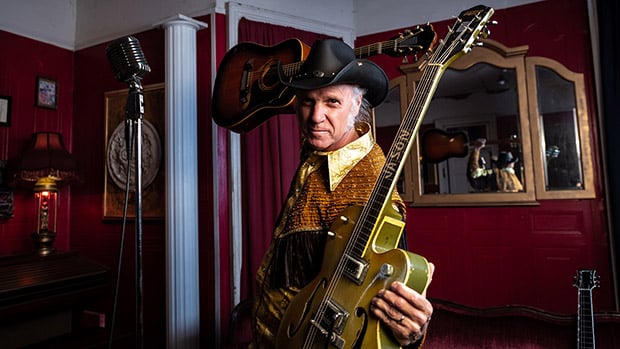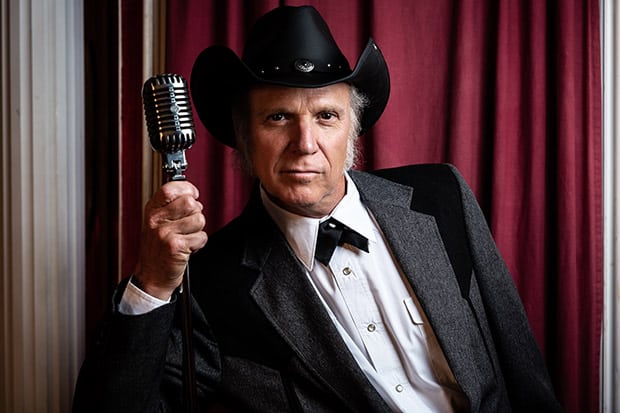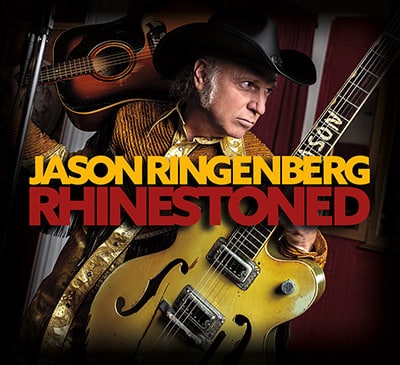
Scott Willis photograph
As with intricate artwork, Jason Ringenberg’s new album, “Rhinestoned,” can be appreciated the deeper it is inspected. The diamonds aren’t real but everything else is brilliant and true.
A month spent in the great outdoors followed by quality woodshedding time isolated in the Covid era kindled the songwriter’s thoughtful mind.
That led to Ringenberg’s 18th album, which was released on March 5 on the Courageous Chicken label. “Rhinestoned” features the 62-year-old Nashvillian’s myriad interests, styles and beliefs, all delivered in positively compelling narrative.
Many of the songs on “Rhinestoned” are those that didn’t fit the theme of the 2018’s acclaimed “Stand Tall,” Ringenberg’s first solo album since 2004. (That excludes his four Farmer Jason’s children’s albums.) He, of course, is the frontman of cowpunk heroes, Jason and the Scorchers, which last put out a record in 2010.
A monthlong stay at California’s Sequoia National Park sparked ideas for the songs.
“It was more like an explosion rather than a spark,” Ringenberg said. “It was really an exciting experience to have nothing to do except enjoy the beautiful nature and to write songs and to do some shows in the park.”
Ringenberg followed the spirit of his muse Bob Dylan during daily hikes into a dramatic landscape of giant sequoia trees, mountains and vast canyons.
A country music lover who grew up on an Illinois farm, Ringenberg came up with the idea many years ago to speed up Dylan covers with his college band, Shakespeare’s Riot. That was the genesis of the alt-country/cowpunk genre.
Ringenberg said he had to “de-Dylanize” the songs he wrote in the national park and give them a Harlan Howard makeover. Howard is the country legend who came up with the phrase, “Three chords and the truth.”
Meanwhile, back at the ranch, the pandemic halted live performances, and Ringenberg hunkered down and finished up the songs that he did not include on “Stand Tall,” and to write some new ones. His pet chickens evaluated his work.
“They can be really rough critics,” he said. “If there’s a worm crawling around, they’ll forget all about the song and just go eat the worm. They can be rather rude.”
Producer and phenomenal multi-instrumentalist George Bradfute was more attentive. Also pitching in for the studio sessions were drummer Steve Ebe, who when he lived in Memphis used to bang around with Carl Perkins and Duck Dunn; and steel guitar and fiddler Fats Kaplin, who has worked with everyone from Jack White to John Prine. Backing singers were Katie Rose, Mark Andrew Miller and Ringenberg’s daughters Addie and Camille.
What especially stands out are the last three songs Ringenberg wrote during the lockdown.
“I Rode With Crazy Horse” This song has a melody that will remain in the listener’s head after the record has stopped spinning. Ringenberg has an appreciation for history and what’s right and wrong. Here is a tale of a Lakota war leader and a tribute to his honor.
“The Freedom Rides Weren’t Free” This is a story about the under-reported college students and civil rights activists from Nashville who were among the second wave of protesters that dared step aboard buses in Alabama. This song could be used in collaboration with a book by Nashville photojournalist John Partipilo.
“Before Love and War” Shakespeare, he’s in the alley, with pointed boots and his cowbells: Ringenberg added twang to his tunes drafted in singer-songwriter style, but for this one with a scene set in Flanders, Belgium during World War I, he removed the country stylings of co-writer Arty Hill. That gives the song an ambiance of Impressionist poetry. This opening song resonates with haunting baritone guitar and introduces the album in mysterious and bold fashion. Ringenberg and co-writer Hill have painted a masterpiece.

Scott Willis photograph
After feeding his chickens on a recent morning, Ringenberg took a phone call to field questions about some our favorite his songs on “Rhinestoned.” What follows is a condensed version of the interview.
Tahoe Onstage: “Keep That Promise” is so hard-rocking and lyrically clever, it is emblematic of the cowpunk spirit.
Jason Ringenberg: That’s what it was meant to be, and George (Bradfute) really nailed it with the production.
Q: Your peer John Doe of the band X said he hated the music being called cowpunk, saying that it kind of disparaged the genre and it led to diminished popularity. Do you agree?
A: I do. It certainly cheapens what a lot of us were doing, but it also was very descriptive. A lot of the bands that were doing that stuff, at least they had a country songwriter sensibility in their art. It wasn’t just loud party and beer drinking music. So that got left out in that term, but for a basic description, that’s pretty close.
Q: You said, “I Rode With Crazy Horse” Came to you in a dream. Was that the lyrics, the melody or both?
A: I was thinking about writing as song about Crazy Horse and the idea of him having a companion who was with him at all those battles, but I hadn’t written any melody or words. It all came to me at once sort of in a dream. I woke up and was able to grab my phone real quick so I could hit record and I sang it and got as many ideas as I could before I forgot the ideas.
Q: You are a devout Christian as shown in the album’s inclusion of the song “Christ The Lord Has Risen Today.” In “Crazy Horse” you wrote he was buried in a secret place so that nobody could “Christianize his fate.” Can you explain that?
A: I thought that was important to say. The song goes in and out of reality and my own creation but that is supposedly true that his parents and that friend exhumed his grave and they buried in a place where he wouldn’t become a tourist attraction and they wouldn’t put up a Christian headstone. Crazy Horse obviously is not Christian. They buried him in a secret place that to this day no one knows where it is. Eventually they would have made a wild west spectacle out of it. They’d have figured out a way to desecrate it. Yep, that would have happened with Crazy Horse. He was the most famous and most uncorrupted Native American leader of his time. They would have had a field day with him..As it is, we don’t even a picture of the guy and that’s pretty cool. That’s as it should be.

Q: You’ve lived in Music City for decades and have witnessed the change in music. It must be sad, and that’s what you seem to be saying in “Nashville Without Rhinestones.” Correct?
A: It’s not really about the Nashville music community, although there’s some of that in the song. It’s mostly about the boomtown development-at-all-costs mentality that is now ruling Nashville. They’ll tear down a stone age monument to put up a tacky condominium if it’ll make them money.
Q: On the album sleeve where the lyrics are provided, you added a note that reads, “My Highway Songs” is “100 percent autobiographical.” You ask, “… either as a king or as a lonely pawn, is there a place in this world for my highway songs?.” Can you elaborate?
A: If you talk to almost any artist on this planet, any musician or creative spirit, and they’re all going to have doubts if they’re worthy of being able to stand on this platform and do what they do. And I do that too. Although it may be a little more dramatic with me because I am not a commercial smash success. So I wonder and think, “Do I have the capabilities of, the talents to, be a real recording artist? The numbers don’t really show that (I do) but the impact I’ve had on fans does show it. The connection I’ve made does show it.
Q: Regarding “You Win Again,” have you recorded a lot of Hank Williams songs?
A: I have. We’ve done “Lost Highway,” “Honky Tonk Blues,” “I Saw The Light.” I’ve sang a lot of Hank songs live. I’ve been singing “You Win Again” a long, long time. I first heard that on a Jerry Lee Lewis bootleg record. He sang it live and he just destroyed it. It was so good. I’ve always loved that song and it was the perfect time to use it.
Q: I had to dig deep to learn about the cover you did of “Time Warp” by the Ozark Mountain Daredevils. Why did you pick that song?
A: I always was an Ozark Mountain Daredevils fan and I wanted to show different time periods of country music that had meant something to me. So I did the Carter family, Hank Sr. and, of course, a little church hymn. But the Ozark Mountain Daredevils represented the best of the country rock world. Lyrically there is a lot of connections with the rest of the album. It talks about Custer’s Little Big Horn, it talks about aging, it talks about artists with Vincent van Gogh.
Q: “The Freedom Rides Weren’t Free” is timely in light of the protests that came after George Floyd died.
A: I actually wrote that song before the racial strife of the summer. I wrote that in April, around the time I also wrote “Crazy Horse” and “Love and War.” It was interesting that the last three songs I wrote had the most impact on the record. I had been kicking around the idea because it’s such a compelling story. Not just the Freedom Riders, of course, which everyone knows about. A side chapter to it, a lesser-known fact, is a second wave of Freedom Riders. A lot of them were from Nashville. They were completely on their own. They had no support from the NAACP or the Kennedy Administration or from any money people, power people or lawyers. They were just a bunch of college kids with no money. They pooled their pocket money to go down to Alabama to get back on those damned buses with no one to back them up. Knowing they were going to get beaten and jailed. It’s an incredible story. It almost brings me to tears when I talk about it.
Q: In John Partipilo’s article in the Tennessee Lookout, one of the surviving Freedom Riders, Fredrick Leonard was sentenced to 60 days at Parchman Farm prison in Mississippi for the crime of walking into the white section of a bus depot in 1961. Guards spiked he and is cellmates food with laxatives and cut off the water to the toilets. They removed mattresses in order to have then sleep on either a wire frame or the concrete floor. Then they had a fellow prisoner beat him. That’s torture.
A: That’s what that is, sir. Absolutely. And in the United States of America. Because they wanted to ride the same buses as white people. It’s just shameful. I’m a patriot but, my God, you look at that and you’ve got to say that’s just horrible. There’s people alive today who did that to other human beings. And that’s the first line of the song: “Time is more forgiving the farther back you look. It’s easier to cut some slack to someone in a book.” I, undoubtedly living in Nashville, Tennessee, have had dealings with people or had fathers and mothers of people who did those things. That’s truth. There was very little support for desegregation in the American South among white Southerners. It’s a horrible thing to say but it is the truth.
Q: Outlaw Country gave you a four-hour guest DJ slot last weekend to talk about the album and play some of your favorite songs. You said the three songwriters who influence you the most were “Bob Dylan, Bob Dylan and Bob Dylan.” To follow up, I’d like to ask which Dylan album is your favorite?
A: That’s a tough question. I can go with five Dylan albums. I don’t think could go to one. It would be impossible. “Freewheeling,” “Bring It All Back Home,” “Highway 61,” “Blonde On Blonde” and “Blood On The Tracks. I don’t think I could live without those records. My five desert island discs would be those five records. We’re so blessed to have Bob Dylan on this planet still to this day.”
-Tim Parsons
- Jason Risenberg
- ‘Rhinestoned’
- Label: Courageous Chicken
- Release: March 5, 2021
Related: Tahoe Onstage picks its top 10 Bob Dylan albums.
